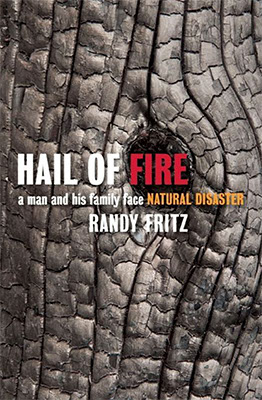 Michelle Newby is contributing editor at Lone Star Literary Life, reviewer for Foreword Reviews, freelance writer, member of the National Book Critics Circle, and blogger at www.TexasBookLover.com. Her reviews appear or are forthcoming in Pleiades Magazine, Rain Taxi, World Literature Today, South85 Journal, The Review Review, Concho River Review, Monkeybicycle, Mosaic Literary Magazine, Atticus Review, and The Collagist.
Michelle Newby is contributing editor at Lone Star Literary Life, reviewer for Foreword Reviews, freelance writer, member of the National Book Critics Circle, and blogger at www.TexasBookLover.com. Her reviews appear or are forthcoming in Pleiades Magazine, Rain Taxi, World Literature Today, South85 Journal, The Review Review, Concho River Review, Monkeybicycle, Mosaic Literary Magazine, Atticus Review, and The Collagist.
Lone Star Book Reviews
of Texas books appear weekly
at LoneStarLiterary.com
Randy Fritz
Hail of Fire: A Man and His Family Face Natural Disaster
San Antonio: Trinity University Press
Hardcover, 978-1595342591 (also available in ebook)
320 pages, $24.95
June 12, 2015
“At least seventy thousand wildfires happen every year in America, and most regenerate healthy forests, culling underbrush, improving the soil, and unspooling the life resting inside pinecones….Some of them shed their better natures, mutating into something dangerous enough that heavy equipment and elite firefighters must be called in….Of those, only a few turn into criminals, taking lives and destroying homes. But in the modern era, there have been only two wildfires, both in California, more vicious and pitiless than the one that changed my life after nearly killing me.”
Hail of Fire: A Man and His Family Face Natural Disaster is Randy Fritz’s memoir about the Bastrop County, Texas, wildfire of 2011 — the most destructive in Texas history — that incinerated the Lost Pines area (almost fifty-five square miles) and left nearly 1,700 families (including the Fritz family) homeless.
Fritz viscerally conveys the horror, loss, and regret he experienced. He finds that the John Wayne personality traits that served him well before the fire — antiauthoritarian, argumentative, stubborn, self-absorbed, prideful bordering on hubristic — fail him utterly when depression and the five stages of grief set in. After a diagnosis of PTSD, Fritz finds relief in therapy, surprising himself. “I was a fifty-six-year-old adolescent when the fire happened….But since the fire, maybe for the first time in my life, I consider myself a grown-up. Instead of strong opinions and a need to defend them, now I have one sole unshakable conviction: the futility of dogmatic belief. What could be worse than certitude for a self-aware being in a universe of endless ambiguity and countless contradictions?”
Fritz’s engaging narrative is interwoven with flashbacks that serve to flesh out his family’s lives and powerfully convey what has been lost. His descriptions of the Lost Pines as a primordial and spiritual “private arboretum”, “a dense forest of mature loblolly pines, some of which soared nearly a hundred feet, with four-foot diameters” are deeply affecting in their stark contrast to his imagery post-fire: “It was like the landscape had been flayed, the skin of life surgically peeled off.”
The facts are compelling and the science of wildfires as explained in layman’s terms by Fritz is fascinating. For instance, horizontal roll vortices are “flipped-on-their-side twisters…like a conveyor belt that allows the fire to glide across the forest’s ceiling.” Did I mention it’s also terrifying?
In the end he makes a tentative peace with the fire. “I finally came to understand an essential paradox of a natural or personal disaster. While the wildfire seemed unbelievable, the more unbelievable thing was the general absence of catastrophe in my life despite what surrounds me every minute of every day.” Wounded and brought low by nature, Fritz is also healed by her.
How do you cope when the site of your happiest memories is also the site of your saddest? Can there be a new normal and, if so, how do you get there? Fritz’s goal in writing this book is to help others in the aftermath of disaster and he has succeeded, in both practical and emotional terms.
* * * * *


